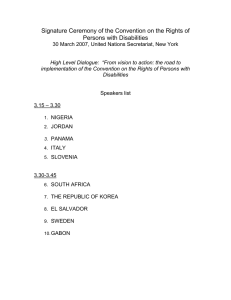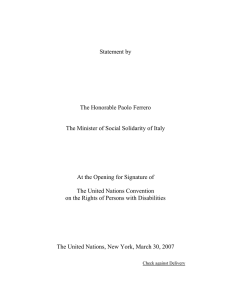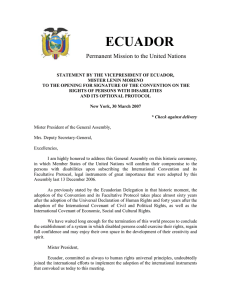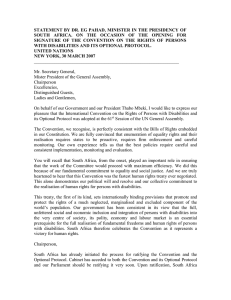Brazil
advertisement
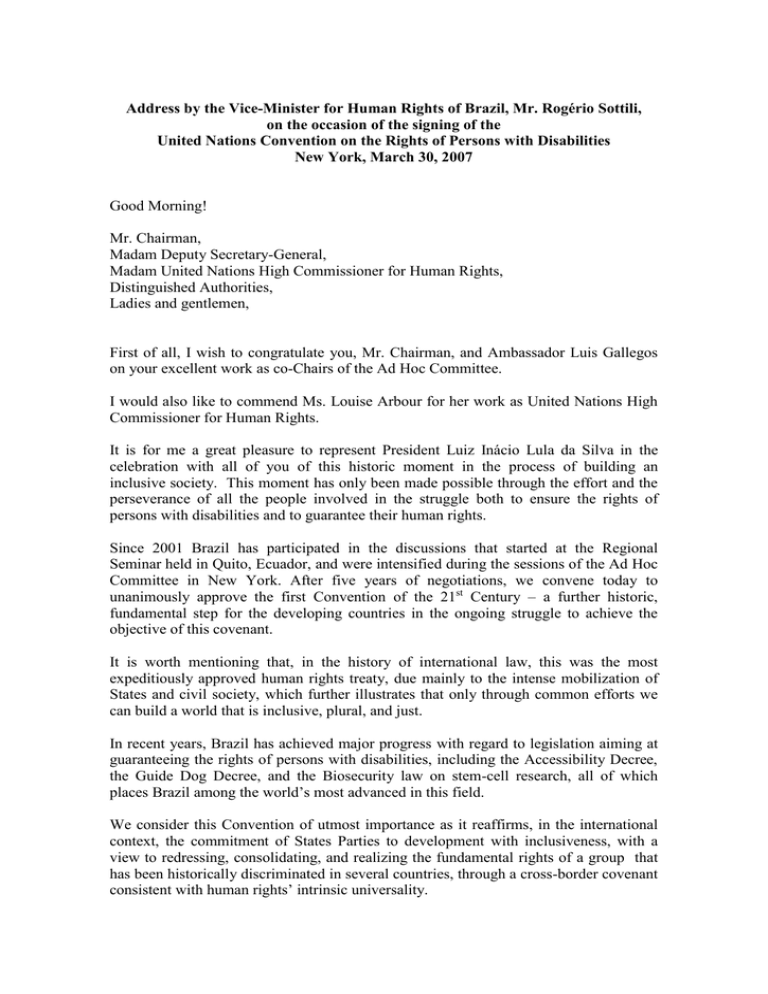
Address by the Vice-Minister for Human Rights of Brazil, Mr. Rogério Sottili, on the occasion of the signing of the United Nations Convention on the Rights of Persons with Disabilities New York, March 30, 2007 Good Morning! Mr. Chairman, Madam Deputy Secretary-General, Madam United Nations High Commissioner for Human Rights, Distinguished Authorities, Ladies and gentlemen, First of all, I wish to congratulate you, Mr. Chairman, and Ambassador Luis Gallegos on your excellent work as co-Chairs of the Ad Hoc Committee. I would also like to commend Ms. Louise Arbour for her work as United Nations High Commissioner for Human Rights. It is for me a great pleasure to represent President Luiz Inácio Lula da Silva in the celebration with all of you of this historic moment in the process of building an inclusive society. This moment has only been made possible through the effort and the perseverance of all the people involved in the struggle both to ensure the rights of persons with disabilities and to guarantee their human rights. Since 2001 Brazil has participated in the discussions that started at the Regional Seminar held in Quito, Ecuador, and were intensified during the sessions of the Ad Hoc Committee in New York. After five years of negotiations, we convene today to unanimously approve the first Convention of the 21st Century – a further historic, fundamental step for the developing countries in the ongoing struggle to achieve the objective of this covenant. It is worth mentioning that, in the history of international law, this was the most expeditiously approved human rights treaty, due mainly to the intense mobilization of States and civil society, which further illustrates that only through common efforts we can build a world that is inclusive, plural, and just. In recent years, Brazil has achieved major progress with regard to legislation aiming at guaranteeing the rights of persons with disabilities, including the Accessibility Decree, the Guide Dog Decree, and the Biosecurity law on stem-cell research, all of which places Brazil among the world’s most advanced in this field. We consider this Convention of utmost importance as it reaffirms, in the international context, the commitment of States Parties to development with inclusiveness, with a view to redressing, consolidating, and realizing the fundamental rights of a group that has been historically discriminated in several countries, through a cross-border covenant consistent with human rights’ intrinsic universality. 2 Accordingly, Brazil has signed, without reservations, the Convention and its Optional Protocol and reaffirms its commitment to making the necessary efforts to its incorporation into the national law system, as it has done with the Inter-American Convention on the Elimination of All Forms of Discrimination against Persons with Disabilities. Thus, Mr. President, I would like to salute all the participants in this process on this day – March 30, 2007 – which passes to history as a further milestone in the promotion and protection of human rights, in the defense of the diversity of life, and in the fight for the recognition of minorities, persons with disabilities, children and adolescents, the aged, the GLTB people, and of religious diversity, as well as the right of all people to be free and respected, regardless of their color, race, sexual orientation, religion, gender, and ethnic origin, among other aspects. We are today taking another major step toward the construction of a more just and equal society, the consolidation of democracy, and the realization of the principle of human dignity. Thank you.

